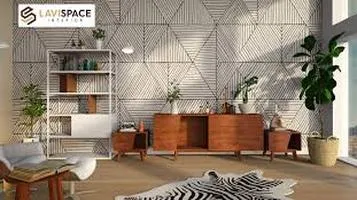Sustainable Home Decor - Transforming Spaces Responsibly
Sustainable home decor focuses on creating beautiful living spaces while minimizing environmental impact. It emphasizes the use of eco-friendly materials such as reclaimed wood, organic textiles, and recycled metals, ensuring that each piece contributes to a healthier planet. This approach often involves selecting items that are durable and timeless, reducing the need for frequent replacements. Many sustainable decor options are handcrafted by artisans, supporting local economies and preserving traditional crafts. Additionally, sustainable home decor often incorporates energy-efficient lighting and native plants, promoting a harmonious and green living environment. By prioritizing sustainability, homeowners can enjoy aesthetically pleasing spaces that reflect a commitment to environmental responsibility and contribute to a more sustainable future.

In an age where environmental consciousness is no longer a choice but a necessity, the realm of home decor has seen a significant shift towards sustainability. Sustainable Home Decor is not just a trend; it's a movement that combines aesthetic appeal with eco-friendly practices. This review delves into the importance, benefits, and challenges of adopting sustainable decor, while highlighting some stellar brands and products that are leading the charge.
Why Sustainable Home Decor?
The environmental impact of traditional home decor is substantial. From the deforestation for wooden furniture to the harmful chemicals in paints and finishes, the choices we make for our living spaces can have far-reaching consequences. Sustainable home decor aims to minimize these impacts by using eco-friendly materials, reducing waste, and promoting ethical production practices.
One of the core principles of sustainable decor is the use of renewable resources. Bamboo, for instance, is a popular choice due to its rapid growth rate and minimal need for pesticides. Reclaimed wood is another excellent option, offering a rustic charm while preventing further deforestation. Additionally, natural fibers like organic cotton, jute, and hemp are increasingly being used for upholstery and textiles, providing a healthy alternative to synthetic materials.
Benefits of Sustainable Home Decor
1. Environmental Impact: The most obvious benefit is the reduction in environmental footprint. By choosing products made from renewable or recycled materials, we help conserve natural resources and reduce pollution.
2. Healthier Homes: Many conventional home decor products contain volatile organic compounds (VOCs) and other harmful chemicals that can affect indoor air quality. Sustainable products, on the other hand, prioritize non-toxic finishes and natural materials, creating a healthier living environment.
3. Durability and Quality: Sustainable products are often crafted with care and attention to detail, resulting in higher quality and durability. This longevity means fewer replacements and less waste over time.
4. Ethical Production: Sustainable decor brands often emphasize fair trade practices, ensuring that artisans and workers are paid fairly and work in safe conditions. This ethical approach supports communities and promotes social responsibility.
Challenges of Sustainable Home Decor
Despite its many benefits, sustainable home decor does come with its challenges. One significant hurdle is cost. Sustainable products can be more expensive due to the higher quality materials and ethical production practices involved. However, many argue that the initial investment pays off in the long run through durability and reduced replacement costs.
Another challenge is availability. While the market for sustainable decor is growing, it can still be difficult to find a wide variety of options in some regions. This limitation often requires consumers to do more research and sometimes compromise on style or availability.
Leading Brands and Products
Several brands have emerged as leaders in the sustainable home decor space, offering innovative and stylish solutions that do not compromise on environmental responsibility.
1. West Elm: This well-known retailer has made significant strides in sustainability, offering FSC-certified wood furniture, organic textiles, and fair trade products. Their commitment to eco-friendly practices has made them a go-to choice for conscious consumers.
2. VivaTerra: Specializing in eco-friendly decor, VivaTerra offers a range of products made from natural and recycled materials. Their collections often feature unique, handcrafted items that add a personal touch to any home.
3. Etsy: While not a single brand, Etsy provides a platform for artisans and small businesses to sell handmade, sustainable products. From upcycled furniture to organic cotton cushions, Etsy is a treasure trove of eco-friendly decor options.
4. Avocado: Known primarily for their mattresses, Avocado also offers a range of sustainable home goods. Their commitment to using organic and non-toxic materials extends to their bedding, furniture, and home accessories.
Tips for Adopting Sustainable Home Decor
1. Start Small: Transitioning to sustainable decor doesn't have to be overwhelming. Begin with small changes, such as replacing synthetic cushions with organic cotton ones or choosing reclaimed wood picture frames.
2. Do Your Research: Look for certifications like FSC (Forest Stewardship Council) for wood products, GOTS (Global Organic Textile Standard) for textiles, and Fair Trade for ethically produced goods. These certifications provide assurance that the products meet specific environmental and social standards.
3. Upcycle and DIY: Get creative with upcycling old furniture or decor items. A fresh coat of non-toxic paint or new upholstery can breathe new life into tired pieces. DIY projects not only reduce waste but also add a personal touch to your decor.
4. Invest in Quality: While sustainable products can be more expensive, investing in high-quality, durable pieces can save money in the long run and reduce waste.
Conclusion
Sustainable home decor is more than just a buzzword; it's a commitment to creating beautiful, healthy, and environmentally responsible living spaces. While there are challenges to adopting sustainable practices, the benefits far outweigh the drawbacks. By making informed choices and supporting brands that prioritize sustainability, we can all contribute to a healthier planet while enjoying stylish and durable home decor.






